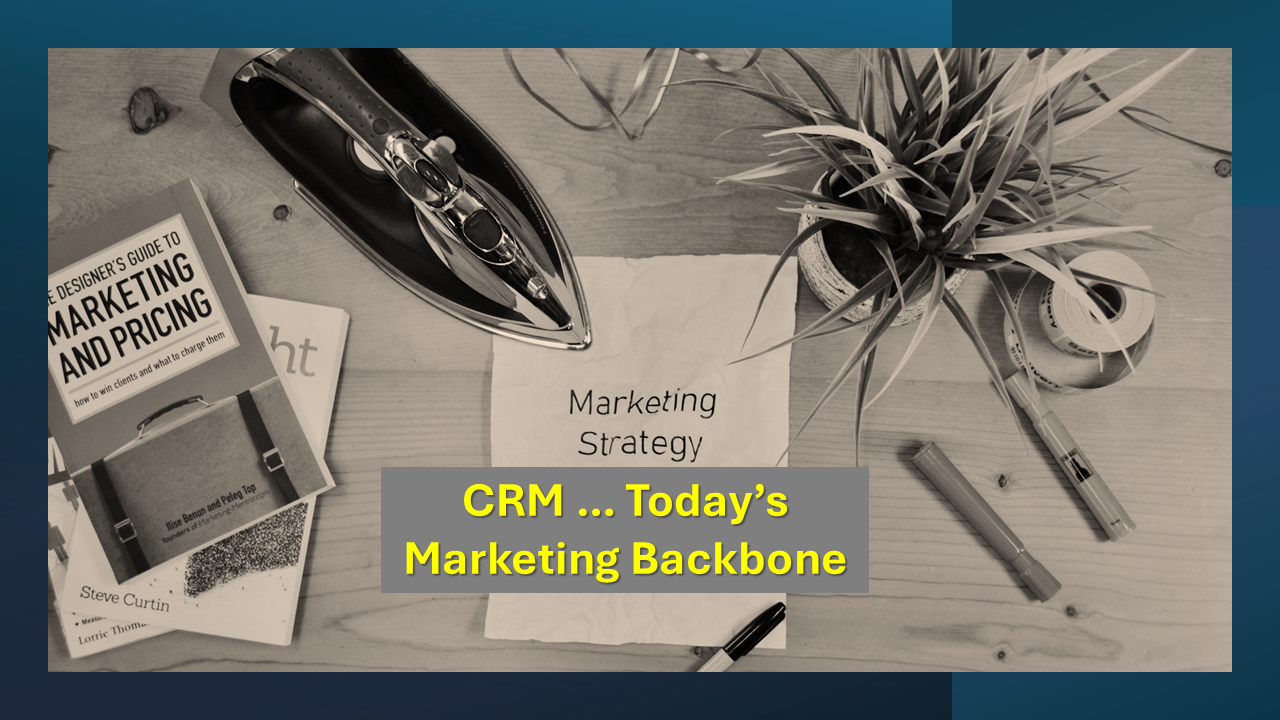
Marketing for distribution today requires more nuance than ever before. It is no longer solely counter days, events (especially golf!), flyers, short-term promotions and logoed items. It’s more about strategy, analysis, targeting customers, determining messaging, tailoring offers to selected audiences, promoting your value proposition and more.
Further, giving a flyer to your sales organization to share with their customers is only a part of your communication strategy. An integrated marketing approach is needed.
And management is no longer only asking sales about performance, they are asking marketing to justify itself.
For these reasons, and more, a CRM is nowadays the backbone of a good marketing strategy (notice I didn’t say “best in class.”) It is becoming a requirement.
While CRM is thought of as a sales tool, and it can be, its value goes much further. Consider it a customer information repository system. This is needed to enable marketing to 1) do its job and 2) to determine who is responding to which communications engagement. Further, it enables customer contact information to be centralized and maintained.
Notice I didn’t say anything about capturing sales / customer interactions? This could be a bonus.
I’d like to introduce you to Katrina Olson. Katrina and I have known each other for too many years via interactions in the electrical distribution industry. We recently were talking about distribution marketing, and I mentioned the HVAC industry and www.hvacrtrends.com. I found that it is important for marketers, and management, to learn from other industries and not be inwardly focused. Katrina and I discussed bringing some of her electrical marketing insights to the HVAC industry and … she’ll be sharing ideas to help you accelerate your growth.
As I mentioned, CRM is the backbone of a good marketing strategy so it’s no surprise that CRM is Katrina’s first topic!
How a CRM system improves customer service, enhances marketing, and drives sales.
Hi, I’m Katrina Olson, and I’ve been consulting with distributors on marketing for the past 20 years, mostly in electrical. I’ve served as a director of marketing for a multi-location distributor, run my own marketing/communications firm, taught marketing, writing, advertising and PR classes at a Big 10 university. After sitting in on my recent industry conference marketing session, David Gordon asked if I would write a series of articles for HVAC Trends. I responded with an enthusiastic, “Yes, I’d love to!”
Distribution is still very much a relationship business. And while a handshake and a cup of coffee go a long way, you now have access to technology tools to help you build and nurture those relationships. One of those valuable tools is a CRM or Customer Relationship Management system.
A CRM can provide information to help you identify, target, acquire, and retain the best mix of customers. When used properly, it can create, manage, organize, track, and store all customer interactions including contacts, sales leads, clients, demographic or company information, sales history, service requests, and more. CRM systems also can automate many marketing, sales, and support processes, helping you provide a consistent experience to customers and prospects, while lowering your costs.
What else can a CRM system do for you?
- Share real-time customer information across all of your departments, so your customers have a seamless experience
- Streamline your customer relations by automating sales, marketing, and service functions
- Guide and track your customer’s journey within the company from their first website interaction through the sales pipeline
- Help your marketing department create more targeted promotional material that increases the likelihood of a sale
- Create customized and personalized conversations with your customers
- Show your salespeople where their customer is in the sales process and help close the deal
- Send alerts to your salespeople when a customer places an order, visits the website, or otherwise interacts with the company
- Suggest next steps for your staff dealing with a particular customer
CRMs collect and analyze large quantities of customer data to garner insights into buying behavior and purchasing trends. These insights can be used to measure the effectiveness of your current marketing and sales efforts, help you develop smarter marketing campaigns, and enhance your customer service.
Some providers you’ll want to consider are Hubspot (easy to use), Salesforce, Microsoft Dynamics 365 CRM, Apptivo, Zoho, Insightly (good for growing businesses), Pipedrive (good for deal-oriented sales teams), Freshsales (basic CRM), SugarCRM (highly customizable), WebPresented (for distribution), White Cup (for distribution), Proton.AI (for distribution), and LEADsmart Technologies (which has purpose-built solutions for manufacturers, distributors, and reps). And there are many others. Today, almost all systems are cloud-based SaaS (software as a service) solutions with Web-based interfaces, allowing you to access information from any device, at any time.
Most CRM systems also offer marketing automation tools that enable you to send personalized emails to a particular audience segment or deliver customized content to move a prospect through the sales cycle. Marketing automation campaigns can help you generate leads, improve the customer experience, retain customers, or sell products. Once you establish your goal, you develop workflows – a series of automated actions, triggered by a lead’s behavior. You set the rules, create the triggers, and the software does the rest as you manage the digital strategy from a dashboard.
How to Choose the Right System
You have a lot of options when it comes to CRM systems, and most of them are pretty good. But to make sure you get the best fit, take the following steps
Determine your needs.
Read articles, attend webinars, meet with vendors, read reviews, get recommendations, and take advantage of free trials to understand the features, benefits, capabilities and limitations of the system you’re considering. Consider reaching out to various CRM companies and ask your distribution friends what they are using! This is a time where you should explore to understand the market.
Consult with potential users.
All departments who will use the system should be involved in the decision. They will all need to use it frequently and consistently, and keep information updated. A system with inaccurate or outdated information is not very useful.
Consider the customer journey.
Sales and marketing are both involved in the customer journey. Marketing generates leads which are then passed on to sales, who ideally closes them. How will you measure conversion rates? This will determine rules and workflows for marketing automation.
Introduce new tech in phases.
Learning a new system can be overwhelming. Start with the big picture and share the benefits of the system and why each department is important. Then thoroughly train everyone, not just initially, but provide ongoing training including refresher courses and updates. (As a side not, gaining adoption can be challenge. These thoughts on change management may help.)
Introducing new technologies takes time, especially when it affects everyone in the company. You may not see an immediate return, but as your staff learns to use the new system, your ROI will steadily increase.
What are your marketing challenges? 
To ensure we’re addressing your needs with relevant content, HVAC would like your input. Please click here to take our HVACRTrends Marketing Survey. our answers will determine the subject matter of future articles and enable us to help you better market and grow your business.
As an incentive, if you choose to identify yourself on your survey, you’ll be entered in a drawing for a free one-hour virtual marketing consultation.
Katrina Olson is principal of Katrina Olson Marketing + Training. She speaks to companies and organizations about marketing, she coaches individual marketers, consults with distributor and other B2B clients, and writes for several industry trade publications. She can be reached at katrina@katrinaolson.com



Leave a Reply